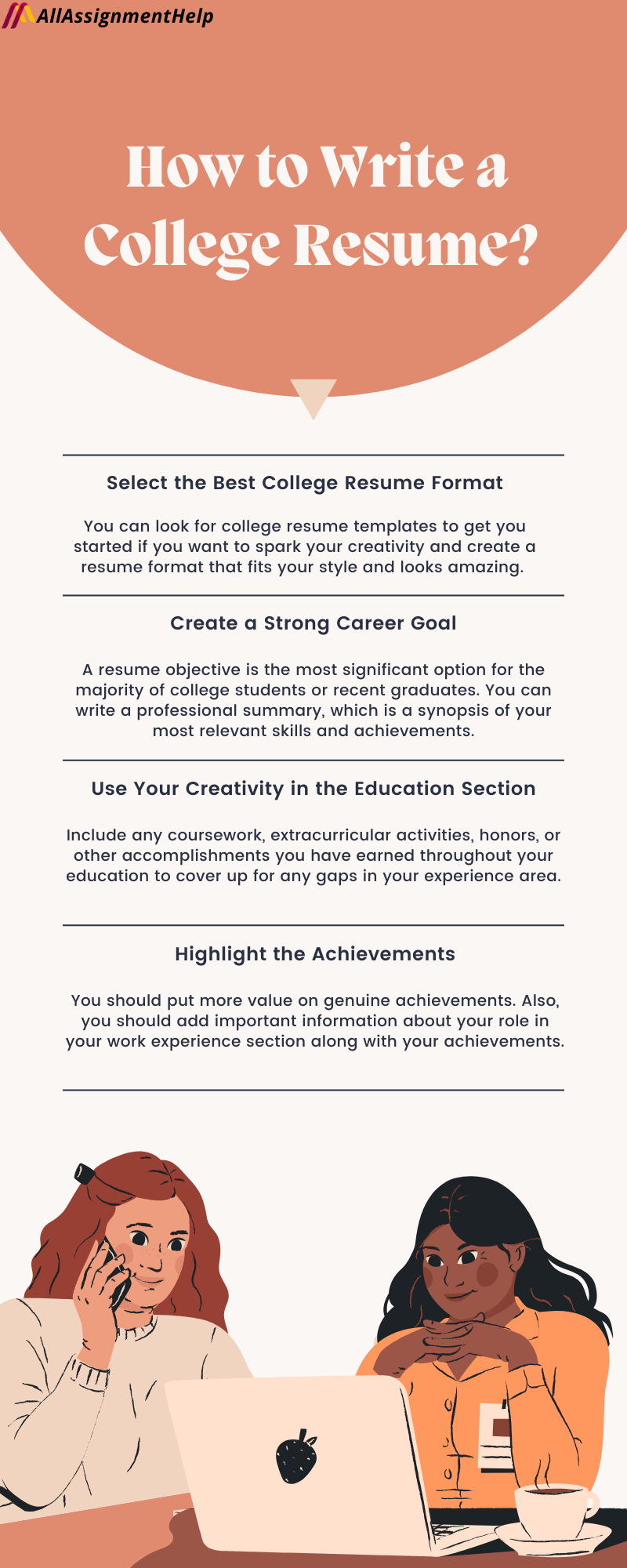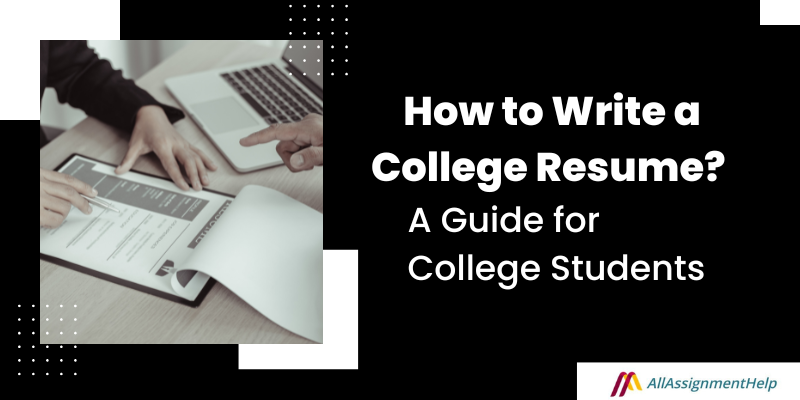Table of Contents
Resumes are no longer mandatory only for graduates. Nowadays, resumes are important for college admissions and job seekers. A strong college application resume highlights your accomplishments, skills, and academic objectives, regardless of whether it is required by the Common App or the university’s application platform. It can also help you get a job while you are in school and impress scholarship committees. However, students often make mistakes or don’t know how to write a resume. Thus, we at All Assignment Help have curated a detailed guide in which we will discuss the best college resume format, how to write one for your college, and some basic tips.
What is a College Resume?
College students use a professional document called a resume to highlight their qualifications, experience, and credentials. College students can show a wide range of extracurricular activities and skills to prospective employers, even if they may lack professional experience. These might include any relevant volunteer work, internships, cultural events, conference paper presentations, or any other experience you have acquired throughout your career.
Writing a resume while being in college is not easy. Many students look for college resume templates or tips to write one on their own. However, you can go for resume writing services online and hire a writer to create a resume for you as per your course needs and requirements. For example, if you are pursuing nursing, you can hire an expert from a nursing resume writing service who will create a perfect college resume for you highlighting your skills and experience in nursing.
Read Here: Resume Format – A Guide for Assistance
Format for Writing a College Resume
Your goal while writing a resume for college applications should be to concisely highlight your leadership abilities, extracurricular activities, academic accomplishments, and personal interests.
Have you written a college application essay but have no idea about college application resumes? No worries; here is the guide for you. Learn how to format your resume perfectly with the below-given tips:
Contact Information
At the top of your resume, include:
- Your full name in bold or a slightly larger font.
- A professional email address (avoid casual handles).
- Phone number with an area code.
- City and State.
- A link to your LinkedIn profile, online portfolio, or personal website, if applicable.
Objective
Write a concise summary (2-3 sentences) about your academic interests and future goals.
- Clearly state your aspirations related to your intended major or career field.
- Mention specific qualities or experiences that make you a good fit for college.
Education
This section highlights your academic background:
- Include your high school name, city, and expected graduation date.
- Mention your class rank, if impressive.
- List relevant coursework like AP, IB, or advanced classes related to your intended major.
- Any academic honors, such as Honor Roll, Dean’s List, or scholarships.
Extracurricular Activities
Show your engagement beyond academics by listing clubs, sports, or organizations:
- Name the activity/club, your role, and duration (for example President, Member, 2022–2024).
- Describe your responsibilities, leadership roles, or achievements.
Work Experience or Internships
Highlight your professional experience or internships, if any:
- Name the company/organization, your job title, and employment dates.
- Describe your duties, contributions, or achievements.
Community Service and Volunteer Work
Showcase your commitment to giving back:
- Name the organization, your role, and volunteer dates.
- Describe your contributions and the impact of your work.
Skills
Highlight your core competencies relevant to your college goals:
- Technical Skills: List any tools, software, or programming languages.
- Interpersonal Skills: Communication, teamwork, leadership, etc.
- Other skills like proficiency in foreign languages, typing speed, or artistic abilities.
Achievements and Awards
Include recognitions or accomplishments to stand out:
- Award Name, Date, and Organization.
- A brief description of why you received it or its significance.
The thought of entering the job market while still in college can appear a little daunting. Also, you might be wondering about how your college experience can be translated to your first internship or employment. Do you possess the skills and background required to attract a hiring manager’s attention? Don’t worry! You can get online assignment help from resume writing experts who will help you create a stand-out resume that will surely impress the hiring manager or you can look for the best college resume format and template available online to get an idea of creating one on your own.
How to Write a College Resume – Resume Tips for Students
As a recent graduate or college student, you have probably already acquired a lot of the skills and knowledge necessary to prepare for the job market. However, you can still write a compelling college application resume that attracts business entities even if they have no prior work experience. Don’t know how? Let’s read below and learn how you can write a standout resume on your own:

Select the Best College Resume Format
Relevant content and attractive design have become the benchmark for attracting employers in the modern workplace. Thus, why not use an eye-catching design to differentiate yourself from other applicants? Canva has some fantastic college resume templates to get you started if you want to spark your creativity and create a resume format that fits your style and looks amazing. Furthermore, the finest resume format utilizes vacant space effectively to prevent clutter and is well-structured, containing only the most important details.
Create a Strong Career Goal
A resume objective is the most significant option for the majority of college students or recent graduates. It is a one-paragraph statement that explains how you are going to give the employer your all. You can write a professional summary, which is a synopsis of your most relevant skills and achievements. One of the bonus resume tips for students while writing their career goal is that they can add transferrable skills businesses favor applicants who possess transferable skills. Also, this eliminates the need for training.
Use Your Creativity in the Education Section
Don’t be intimidated if the job you are applying for doesn’t exactly match your degree. You can still show the traits that employers value, such as a strong work ethic, dedication, leadership, and a desire to do better, by showcasing your commitment to your education. Hence, include any coursework, extracurricular activities, honors, or other accomplishments you have earned throughout your education to cover up for any gaps in your experience area. Also, you can even include relevant courses and school projects you have finished if your major or minor doesn’t highlight your credentials and areas of specialization.
Highlight the Achievements
College recruiters won’t be impressed if your resume only lists employment or dates; it needs an informative section that highlights your achievements. Use this Google-approved method to make your career successes sparkle for any kind of experience.
Action verb + key skills + quantifiable achievement
You should put more value on genuine achievements. It is not enough to simply state the daily responsibilities of what you do. Also, you should add important information about your role in your work experience section along with your achievements.
List Your Strongest College Skills
Every resume needs skills. You must include a balanced combination of hard and soft skills in your college resume. Make your skills relevant to the particular scholarship, school, or position you intend to apply for. Below we have compiled a list of the skills that you can include in your resume:
- Critical thinking
- Adaptability
- Microsoft Office Suite skills
- Time management
- Communication skills
- Research
- Conflict resolution skills
- Interpersonal skills
Limit It to One Page
A resume shouldn’t be longer than one page. A resume longer than one page is more similar to a curriculum vitae, or CV, even after high school. A lengthy college resume is probably filled with filler and fluff. One-page resumes are a fantastic way to practice writing simply.
Write an Effective Cover Letter
You have prepared your college resume. Is there anything more you need? Yes! It’s best to send a short cover letter even if the employer states that it is not required. According to Pongo, without a cover letter, you are depending only on your resume to make a big enough impact that the hiring manager will call you back for an interview. If you are a new applicant, you will need a strong cover letter to compensate for your resume’s lack of experience. You can convince business entities to hire you over someone with more experience by sending in a personalized cover letter tailored to the business and position you are applying for.
Save in PDF Format
Make sure your resume has a clear and professional title and save it as a PDF. Add “Resume” and your name. Stay away from unclear or unprofessional titles, such as “Resume.pdf” or “asdjks.pdf.”
Example: ElloreJames_NYU_Resume.pdf
A strong college resume can help you in the admissions process and later when you apply for jobs, leadership roles, and internships. Making a strong resume demands work, but most students believe the effort is worthwhile. Moreover, there are a ton of free resume examples and templates available online. You can check them and get an inspiration from them.
Also Read: Opt Resume Writing Service to Skyrocket your Career Goals
College Resume Tips for Students for Successful Application
Since creating the ideal college resume requires a lot of work, we have put together the most important tips for an effective application. Make use of it as a checklist prior to sending in your college resume:
- A well-formatted resume should include an easy-to-read typeface, a font size of 10 to 12, 1-inch margins, and line spacing of up to 1.15 for a well-balanced document.
- Consider using bullet points to break up lengthy sections of text so that recruiters can more easily scan your major points.
- Avoid common resume errors such as using a generic title for your resume file, such as “Resume 2024,” and making typographical or grammatical faults.
- Write a strong letter of application to go along with your resume to speak directly to recruiters and share your individual narrative and how you stand out as an applicant.
Making a college resume doesn’t have to be a tedious process of checking boxes. Imagine it as assembling a video clip of all the things you have accomplished and every skill you have acquired. However, if you need help in writing your resume, you can ask resume writers to help you. Along with writing a resume, the experts can provide complete college assignment help services to students. They can complete the assignments on time and help you score the highest in your college coursework.
FAQs
| Is it important to mention GPA in the resume? You must include your GPA if your GPA is high (usually above 3.0) and related to the job you are applying to. Mention any honors or advanced coursework that shows your analytical skills as well. |
| How is a college resume different from a professional resume? A college resume focuses on academic accomplishments, extracurricular activities, and volunteer work, while a professional resume emphasizes work experience, skills, and industry-specific achievements. |
| How to tailor your resume for different opportunities? Research the opportunity, identify the key skills or qualifications needed, and focus those aspects in your resume. Use keywords from the job description or application details. |
